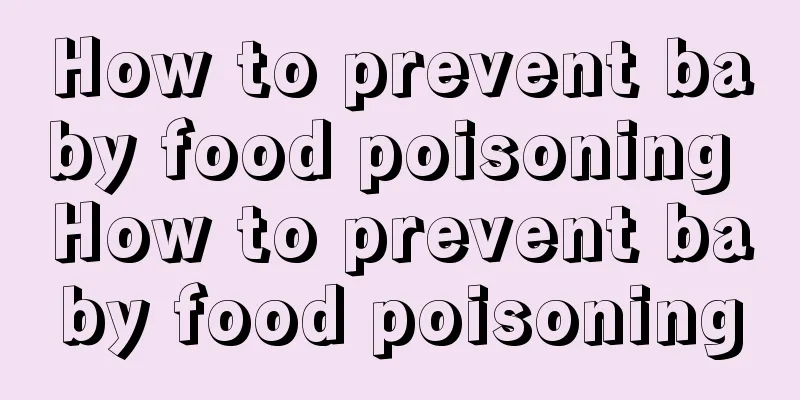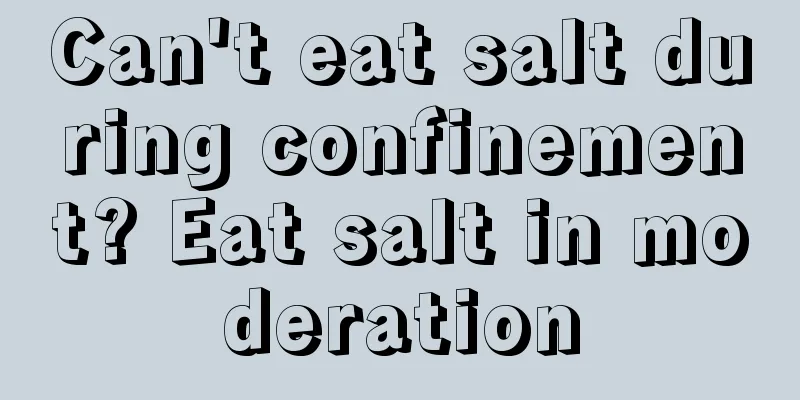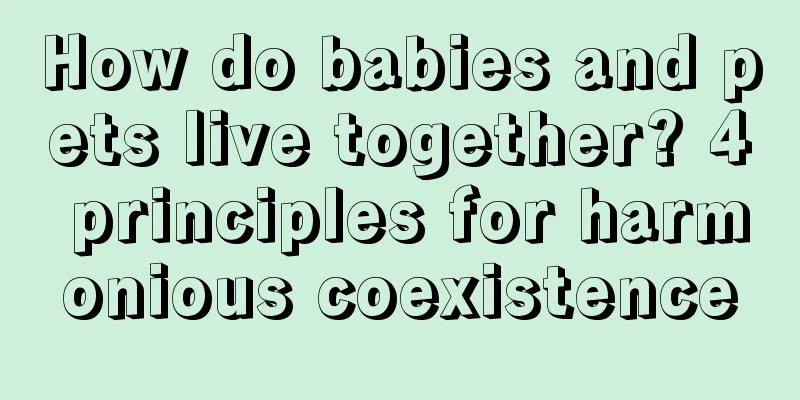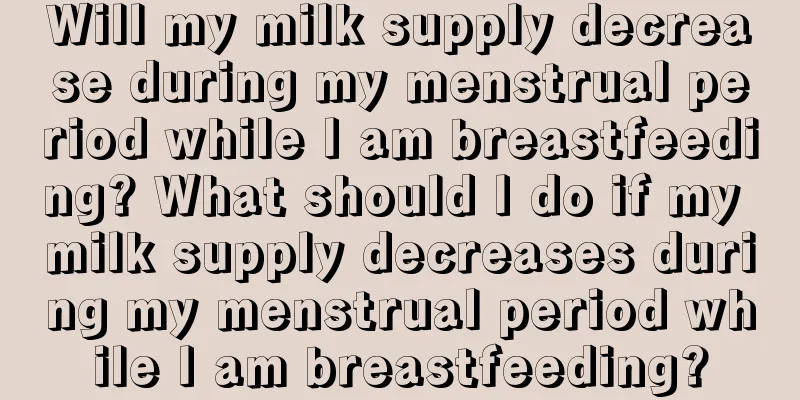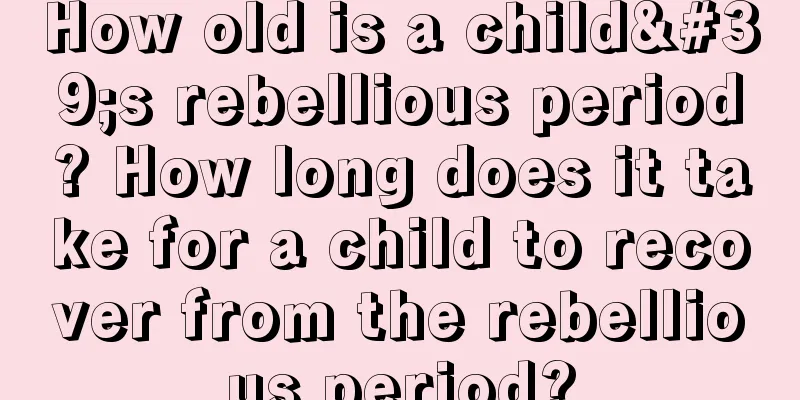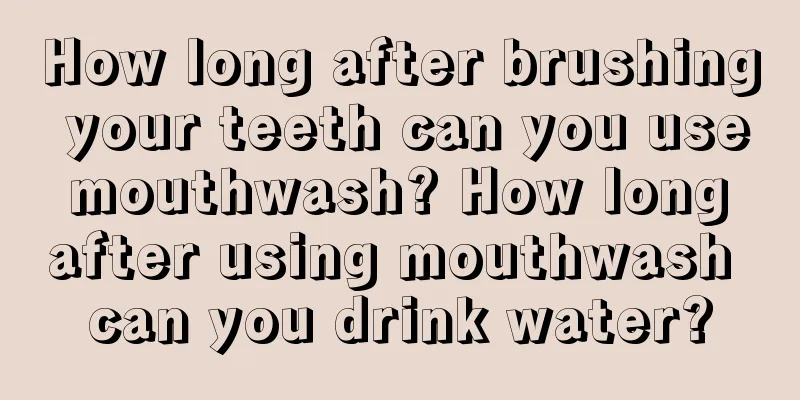The child coughed and vomited. What is the reason for the child's cough and vomiting?
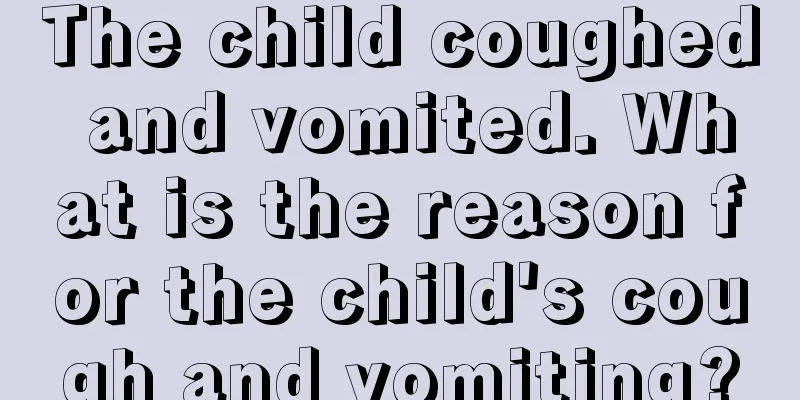
|
Children are usually very susceptible to illness, and the most common illness is cold and cough. However, if the illness is not serious, the child will recover quickly. However, if the illness is not serious, timely treatment is required. So, the child coughs and vomits? What is the reason for the child's cough and vomiting? The child coughed and vomitedWhen a child coughs violently, it may irritate the throat and cause a reflex cough, which is a normal physiological phenomenon. If a baby coughs and vomits, it is considered to be an upper respiratory tract infection or pneumonia caused by cold, environmental factors, etc. If the child's cough and vomiting are caused by contact with allergens, it can be relieved by taking theophylline bronchodilators. It is recommended that the child stop eating immediately when coughing, and drink some warm water when it is slightly relieved, and pat the child on the back to relieve the symptoms. The baby vomits after coughing, and does not vomit when there is no cough, which means that the condition has nothing to do with gastrointestinal diseases, but is just a simple respiratory problem. However, if the child's cough and vomiting are caused by bacterial infection of the trachea and bronchus, it can be treated by taking anti-inflammatory drugs. What causes children to cough and vomit?When children vomit after coughing, especially infants, it is often considered that the sputum is relatively sticky and not easy to cough up, so the child's hard coughing stimulates the nerves and causes vomiting. Traditional Chinese medicine believes that it may also be food accumulation, especially when coughing in the middle of the night and vomiting is dinner or stomach contents. In this case, the younger the child, usually if there is no fever and the mental state is good, you can take medicine on your own and observe, including the use of heat-clearing and detoxifying medicines and digestive medicines, as well as cough and phlegm medicines. If the child's cough is more severe, accompanied by fever or asthma, it is often considered to be acute bronchitis or pneumonia. In this case, it is not recommended to observe at home by yourself. You need to go to the pediatric department for further consultation, blood tests, chest X-rays, and intravenous treatment if necessary. What to do if your child coughs and vomits1. Keep fresh air in the living room. Dirty air can irritate the respiratory mucosa, causing congestion, edema, abnormal secretion or aggravated coughing, which can cause wheezing symptoms in severe cases. Therefore, in order to keep the indoor air fresh, the kitchen should exhaust fumes, parents should not smoke at home, and should open the windows regularly to breathe. 2. Add or remove clothes and blankets in time. Many parents believe that children are more afraid of cold than adults, so they often cover their children too thickly regardless of the season, indoors or outdoors, and prevent them from feeling the slightest bit of cold. As a result, the children's body regulation ability is poor and their resistance is low. 3. Ensure adequate sleep. During sleep, the muscles of the whole body relax, which is conducive to the recovery of various organ functions and the recovery of diseases. Try to let your child rest in bed more and ensure that the child gets enough sleep to facilitate the recovery of the body. 4. Strengthen exercise to improve the body's resistance to disease. Babies should be allowed to do outdoor activities as soon as possible in places with few people and fresh air. In winter, do outdoor activities once a day for 2 to 3 minutes, and gradually extend to 1 to 2 hours. Make an exercise plan for your baby. Do not violate the laws of your child's growth and development. It is best to consult a pediatrician. Child coughs and vomits a lot of mucusWhen the baby coughs, he spits out a lot of mucus. It may indeed be phlegm discharge, because the phlegm coughed up by the baby sometimes does not cough out like adults, it will be swallowed into the stomach. When there is a pharyngeal reflex when coughing, the stomach contents and phlegm will be vomited out. So when the baby coughs, do not feed too much before going to bed, breastfeed multiple times and eat small amounts, and it is best to sleep on your side to avoid choking on vomit. Baby coughing is generally related to tracheitis or pneumonia. At this time, the child may also have digestive tract symptoms. If vomiting is frequent, check the abdomen in time. |
>>: Prevention measures for childhood obesity Standards for childhood obesity
Recommend
How to effectively treat eczema? Treating both internal and external factors is the key
Eczema is a very common symptom in babies. It is ...
Why does the stool smell bad if the baby is breastfed? Protein indigestion
Sometimes babies who drink only breast milk will ...
What causes stomach pain after sex during pregnancy? How to prevent stomach pain during sex during pregnancy
Having sex during pregnancy is a very risky thing...
What should I do if I have a difficult birth in water? Which is better, water birth or painless birth?
Although water birth can help mothers relieve pai...
How can babies eat zongzi to avoid indigestion? What should I do if my child eats too much zongzi?
Eating Zongzi is a traditional custom of the Drag...
The best way for children to lose weight The best way for children to lose weight
Childhood obesity is a prominent health problem i...
Do I need to shave my pubic hair after giving birth? Is it necessary to shave during childbirth?
Many pregnant mothers are confused about whether ...
Does breastfeeding prevent breast cancer? Does not breastfeeding cause breast cancer?
Can breastfeeding prevent breast cancer? Today, l...
What is the cause of the baby's fever and convulsions? How to treat it?
When a baby has a fever and convulsions, it is in...
Can I wear stockings during the summer confinement period? Do I need to wear socks during the summer confinement period?
The weather is hot in summer, and many people are...
What is the chance of pregnancy after IUD insertion? How to get an IUD insertion certificate?
Recently, I heard that some female friends around...
How is the quality of Vinda toilet paper? How to distinguish the authenticity of Vinda toilet paper?
As we all know, toilet paper is a product that we...
Rhymes to coax your baby to sleepRhymes to coax your baby to sleep
Baby sleep is very important, parents will use so...
What are the effects of gestational diabetes on the baby? Symptoms of gestational diabetes
With the improvement of living standards nowadays...
New parents must read: Tips on how to let your baby eat by himself
In order to make their children eat well, mothers...



